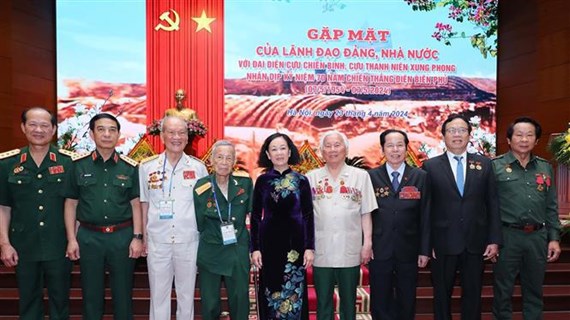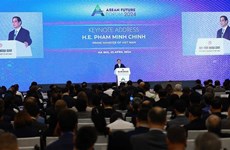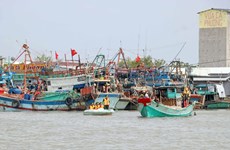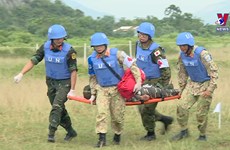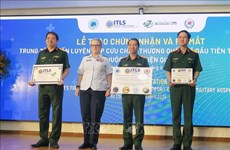WHO provides A/H1N1 vaccine to Vietnam
The World Health Organisation (WHO)
will send 1.2 million pledged doses of ArepanrixTM A/H1N1 vaccine to
Vietnam from now until February 2010.
The World Health Organisation (WHO)
will send 1.2 million pledged doses of ArepanrixTM A/H1N1 vaccine to
Vietnam from now until February 2010.
The WHO representative office in Vietnam on Dec. 9 said that ArepanrixTM adjuvanted vaccine produced by GlaxoSmithKline in Canada was tested by WHO based on a standard protocol and the information on vaccine safety and quality provided in the dossier.
WHO continues confirming that immunization is an effective measure to protect the community, especially high-risk groups including people with chronic diseases, pregnant women, people living in remote and isolated areas, and medical workers from the impact of A/H1N1 flu virus. Vaccination for these groups will reduce the infection, complications and fatalities of A/H1N1 flu, said the organisation.
With regards to the batch of A/H1N1 flu vaccine of GlaxoSmithKline that caused severe adverse effects in Canada , WHO’s representative in Vietnam said that GlaxoSmithKline has actively withdrawn the lot A80CA007 of Arepanrix following observation of higher than expected incidence of anaphylaxis associated with this lot. A total of 172,000 doses were distributed, but after placing its use on hold, over 14,700 doses were kept from use. With the doses not used being accounted, the frequency of anaphylaxis following immunization with vaccines from Lot A80CA007A was 4 per 100,000 doses distributed. This is higher when compared to the usual 0.1-1 per 100,000 doses. Pending further investigations, unused vaccines from this lot have been withdrawn from use.
WHO also confirmed that it had informed its member countries all information on the vaccination as well as unfavourable reactions after being vaccinated.
The decision to share vaccines among 95 low or middle income countries, including Vietnam , is based on WHO’s assessments made in October 2009 before withdrawing the batch of vaccine in Canada , said the organization.
WHO also emphasized the need to vaccinate people against A/H1N1 flu. The risk of vaccine reactions may occur but is much smaller than the risk of contracting A/H1N1 flu that high-risk groups have to suffer.
WHO received donation pledges for about 180 million doses. Of these, GlaxoSmithKline (GSK) pledged 50 million doses in May 2009 and Sanofi Pasteur pledged 100 million doses in June 2009. The current pledges would cover about 10 percent of total population in 95 low- to middle-income countries identified./.
The WHO representative office in Vietnam on Dec. 9 said that ArepanrixTM adjuvanted vaccine produced by GlaxoSmithKline in Canada was tested by WHO based on a standard protocol and the information on vaccine safety and quality provided in the dossier.
WHO continues confirming that immunization is an effective measure to protect the community, especially high-risk groups including people with chronic diseases, pregnant women, people living in remote and isolated areas, and medical workers from the impact of A/H1N1 flu virus. Vaccination for these groups will reduce the infection, complications and fatalities of A/H1N1 flu, said the organisation.
With regards to the batch of A/H1N1 flu vaccine of GlaxoSmithKline that caused severe adverse effects in Canada , WHO’s representative in Vietnam said that GlaxoSmithKline has actively withdrawn the lot A80CA007 of Arepanrix following observation of higher than expected incidence of anaphylaxis associated with this lot. A total of 172,000 doses were distributed, but after placing its use on hold, over 14,700 doses were kept from use. With the doses not used being accounted, the frequency of anaphylaxis following immunization with vaccines from Lot A80CA007A was 4 per 100,000 doses distributed. This is higher when compared to the usual 0.1-1 per 100,000 doses. Pending further investigations, unused vaccines from this lot have been withdrawn from use.
WHO also confirmed that it had informed its member countries all information on the vaccination as well as unfavourable reactions after being vaccinated.
The decision to share vaccines among 95 low or middle income countries, including Vietnam , is based on WHO’s assessments made in October 2009 before withdrawing the batch of vaccine in Canada , said the organization.
WHO also emphasized the need to vaccinate people against A/H1N1 flu. The risk of vaccine reactions may occur but is much smaller than the risk of contracting A/H1N1 flu that high-risk groups have to suffer.
WHO received donation pledges for about 180 million doses. Of these, GlaxoSmithKline (GSK) pledged 50 million doses in May 2009 and Sanofi Pasteur pledged 100 million doses in June 2009. The current pledges would cover about 10 percent of total population in 95 low- to middle-income countries identified./.





